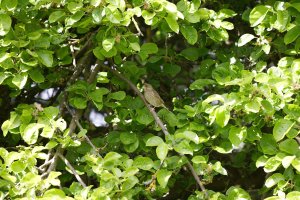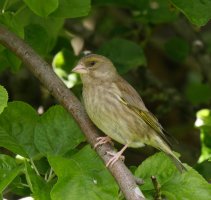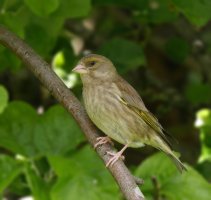You are using an out of date browser. It may not display this or other websites correctly.
You should upgrade or use an alternative browser.
You should upgrade or use an alternative browser.
Canon RF 200-500mm f/4L IS USM confirmed, likely in Q4 [CR3]
- Thread starter Canon Rumors
- Start date
That's been one of the lenses on my 'want' list from Day 1 ...There’s seemingly a 28/2.8 that’s imminent and priced at $300. I’m hoping it’s a pancake, but either way it’s a cheap lens
Upvote
0
Inspecting the metadata of three of them at random, you’re shooting wide open at 500mm and a distance of 8 to 9 metres. I assume therefore these were cropped. You’ve chosen sensible shutter speeds and kept the ISO under control.I’m a birder and have the R5 and 100-500. I’ve attached some images. I like the quality of my photos but often look at images on IG and get super envy. I realize a lot of that is post processing techniques and wizardry and that is not a strong suit of mine. Often the photos I am envious over are taken with a bigger prime type lens. If I buy this 200-500 I think I will hand hold it with my cotton carrier because I wouldn’t want to be hindered by a tripod while birding. I think I will buy this lens because I believe it will take my photos to another level with lower f stop and better bokeh. I’m not sure tho and I’m hoping the scientists on here that pontificate with tables and charts and shit like that can tell me why I shouldn’t do that
In two of the ones I looked at – #3 and #9 numbering left to right and top to bottom, red bird in stream and yellow perched bird – the depth of field doesn’t quite cover the whole bird. A faster lens would leave even less of the bird in focus, unless you stopped it down, in which case, what would be the point?
It seems to me that what you need is a longer lens, not a faster lens.
The other thing is that a lot of the bird photography you see online is staged. An artificial perch is set up near a feeder, and when the bird lands on it before proceeding to the feeder they get their mug shot taken. Inevitably with more birds there will be more keepers than you’d get taking pictures of birds in their real environment.
Take my advice with a grain of salt – I think I have the technical stuff mastered, but your birdcraft might be better than mine.
Upvote
0
We take bird photos for lots of reasons including: just for the record and for the memory, and the quality just has to be good enough; a nicely composed photo where the bird is part of the scene; a bird in action, where speed of AF and tracking really can make a huge difference; shots of birds with appealing poses against the right backgrounds, etc. For me, the excitement is finding rare birds or getting interesting shots of birds in the wild - perched or flying - especially when they are doing things that birds do, from catching prey to courting. It's the thrill of the chase, the rarity of being in the right situation and difficulties that stop it from being boring and keep me going. The great bird photographers I follow use every type of gear, from big whites on pro cameras to shorter lenses on prosumer bodies. What those guys have is talent, and it's their field craft, skills in composition, choice of background etc, spotting a good moment, and knowing how to get the best out of their gear and the situation that makes them great, not the focal lengths and apertures of their lenses - they will get great shots whatever they are carrying. Buying expensive gear won't make a second-rate photographer a first-rate one.Inspecting the metadata of three of them at random, you’re shooting wide open at 500mm and a distance of 8 to 9 metres. I assume therefore these were cropped. You’ve chosen sensible shutter speeds and kept the ISO under control.
In two of the ones I looked at – #3 and #9 numbering left to right and top to bottom, red bird in stream and yellow perched bird – the depth of field doesn’t quite cover the whole bird. A faster lens would leave even less of the bird in focus, unless you stopped it down, in which case, what would be the point?
It seems to me that what you need is a longer lens, not a faster lens.
The other thing is that a lot of the bird photography you see online is staged. An artificial perch is set up near a feeder, and when the bird lands on it before proceeding to the feeder they get their mug shot taken. Inevitably with more birds there will be more keepers than you’d get taking pictures of birds in their real environment.
Take my advice with a grain of salt – I think I have the technical stuff mastered, but your birdcraft might be better than mine.
Upvote
0
I have heard comments from other photographers that the focus and tracking on the Z9 are not up to their expectations either.Crazy... We've not bought any Canon glass since the 1DXMKIII. Until the R1 is out and we can test it with big whites, we're not opening our budget. Ready to buy 20 to 26 R1's and all their new glass kits... Nikon has a made a dent here with the Z9... But to be honest, we're less than thrilled with focus and tracking by Nikon's Z9
Upvote
0
I often buy new lenses when I can't achieve background separation.I’m a birder and have the R5 and 100-500. I’ve attached some images. I like the quality of my photos but often look at images on IG and get super envy. I realize a lot of that is post processing techniques and wizardry and that is not a strong suit of mine. Often the photos I am envious over are taken with a bigger prime type lens. If I buy this 200-500 I think I will hand hold it with my cotton carrier because I wouldn’t want to be hindered by a tripod while birding. I think I will buy this lens because I believe it will take my photos to another level with lower f stop and better bokeh. I’m not sure tho and I’m hoping the scientists on here that pontificate with tables and charts and shit like that can tell me why I shouldn’t do that
It is a common problem with wildlife photos but the background really can be separated in post.
Upvote
0
You are correct, and you see the evidence in photos of others. Also the lower f stop also gives you an edge in lower light. Any scientist here that tells you otherwise that pontificate otherwise are telling you "shit like that". You do not need a new $10K plus zoom prime to see such benefit. Used 500mm F/4 II's are much more reasonable. While skill matters, so does equipment.I’m a birder and have the R5 and 100-500. I’ve attached some images. I like the quality of my photos but often look at images on IG and get super envy. I realize a lot of that is post processing techniques and wizardry and that is not a strong suit of mine. Often the photos I am envious over are taken with a bigger prime type lens. If I buy this 200-500 I think I will hand hold it with my cotton carrier because I wouldn’t want to be hindered by a tripod while birding. I think I will buy this lens because I believe it will take my photos to another level with lower f stop and better bokeh. I’m not sure tho and I’m hoping the scientists on here that pontificate with tables and charts and shit like that can tell me why I shouldn’t do that
Upvote
0
If you say it is correct that an extra 1 2/3rds stops will take your photography to another level, then you are saying that everyone shooting at the higher f-stop is doing so at a lower level. Those extra 1 2/3rds stops may give varying degrees of benefit under certain circumstances (and non-existent for much of the time), but they aren't the factor that determines your level of photography.I think I will buy this lens because I believe it will take my photos to another level with lower f stop and better bokeh. You are correct, and you see the evidence in photos of others. Also the lower f stop also gives you an edge in lower light. Any scientist here that tells you otherwise that pontificate otherwise are telling you "shit like that". You do not need a new $10K plus zoom prime to see such benefit. Used 500mm F/4 II's are much more reasonable. While skill matters, so does equipment.
Upvote
0
Buy this lens if you feel like buying it, and have the money to do so. The extra 1 2/3rds stop can, in some environments, help.But this lens won't turn you into a better photographer. Years ago, I convinced myself that with the Telyt 560mm I'd get "professional" pictures of birds of prey. Nada! Only patience, knowledge of behaviour and growing experience helped. And understanding that many photographers were just much better than I, and this would never change.
Remember that Cartier Bresson only needed a 50mm. Yes, I know, he wasn't a birder.
Remember that Cartier Bresson only needed a 50mm. Yes, I know, he wasn't a birder.
Upvote
0
Good points. For me the number one thing that improved my photography was time spent in the field learning how to compose a photo.If you say it is correct that an extra 1 2/3rds stops will take your photography to another level, then you are saying that everyone shooting at the higher f-stop is doing so at a lower level. Those extra 1 2/3rds stops may give varying degrees of benefit under certain circumstances (and non-existent for much of the time), but they aren't the factor that determines your level of photography.
Upvote
0
D
Deleted member 378085
Guest
I don't, more weight no thanksI hope this one had built-in TC.
Upvote
0
D
Deleted member 378085
Guest
no offence, but what sets my images from yours is the background, Im using a rf 600/4 and I payed the money to get those last 5-10min of opportunity when shooting some wildlife and the other main reason is the background. The background is far different then yours, I would never be happy with how a lens 5.6 and up renders the background. That's my choice and I chose to buy the lens for that purpose.I’m a birder and have the R5 and 100-500. I’ve attached some images. I like the quality of my photos but often look at images on IG and get super envy. I realize a lot of that is post processing techniques and wizardry and that is not a strong suit of mine. Often the photos I am envious over are taken with a bigger prime type lens. If I buy this 200-500 I think I will hand hold it with my cotton carrier because I wouldn’t want to be hindered by a tripod while birding. I think I will buy this lens because I believe it will take my photos to another level with lower f stop and better bokeh. I’m not sure tho and I’m hoping the scientists on here that pontificate with tables and charts and shit like that can tell me why I shouldn’t do that
Upvote
0
On the other hand, numerous wildlife photographers on the internet - including Matthieu at Mirrorless Comparisons, think it is as good - if not better - than most competitors. A lot, of course, depends on how experienced the photographer is with the camera and whether they have set up the camera to best take advantage of the AF.I have heard comments from other photographers that the focus and tracking on the Z9 are not up to their expectations either.
https://mirrorlesscomparison.com/best/mirrorless-cameras-for-birds-in-flight/
Upvote
0
The 200-500 f/4 1.4x would have been the perfect wildlife lens. There's nothing worse that trying to fumble around with an extender in the bush. Dust everywhere, and the animlals only give you a few seconds to get it right and then they're gone. Builtin 1.4x extender means you can get quick shots of small birds without more fumbling and dust.
This is still going to be an awesome lens.
This is still going to be an awesome lens.
Upvote
0
Birdman916 I like your birds a lot. Just keep with it and you'll get the pictures you want. There's no difference between f/1 and f/100 if the background's right behind the subject, or, if the background is featureless or miles off. So just look for shots with the latter and you'll do well.
Upvote
0
Remember that the 600/11 and 800/11 are fixed aperture - they do not have any aperture blades. Less weight, less complicated, less cost.Or compare an 800 mm f11 for $899, vs. a f5.6 800 mm for $17,000. That's $16,000 for a two-stop difference.
Upvote
0
The results of the newer post processing software with AI are impressive. Sharpness and noise are being handled a lot better than a few years ago.I’m a birder and have the R5 and 100-500. I’ve attached some images. I like the quality of my photos but often look at images on IG and get super envy. I realize a lot of that is post processing techniques and wizardry and that is not a strong suit of mine. Often the photos I am envious over are taken with a bigger prime type lens. If I buy this 200-500 I think I will hand hold it with my cotton carrier because I wouldn’t want to be hindered by a tripod while birding. I think I will buy this lens because I believe it will take my photos to another level with lower f stop and better bokeh. I’m not sure tho and I’m hoping the scientists on here that pontificate with tables and charts and shit like that can tell me why I shouldn’t do that
Jack
Upvote
0
And don't forget pure luck that eventually comes from dogged persistence and patience; waiting not chasing.We take bird photos for lots of reasons including: just for the record and for the memory, and the quality just has to be good enough; a nicely composed photo where the bird is part of the scene; a bird in action, where speed of AF and tracking really can make a huge difference; shots of birds with appealing poses against the right backgrounds, etc. For me, the excitement is finding rare birds or getting interesting shots of birds in the wild - perched or flying - especially when they are doing things that birds do, from catching prey to courting. It's the thrill of the chase, the rarity of being in the right situation and difficulties that stop it from being boring and keep me going. The great bird photographers I follow use every type of gear, from big whites on pro cameras to shorter lenses on prosumer bodies. What those guys have is talent, and it's their field craft, skills in composition, choice of background etc, spotting a good moment, and knowing how to get the best out of their gear and the situation that makes them great, not the focal lengths and apertures of their lenses - they will get great shots whatever they are carrying. Buying expensive gear won't make a second-rate photographer a first-rate one.
Upvote
0
Thanks for the heads up. I went out and took a quick snap of a Greenfinch in my apple tree. Cropped the centre, then opened in Photoshop, selected the bird and branch, inverted selection and blurred the background. Voila - you saved me £13000 for getting better subject isolation - thanks again!I often buy new lenses when I can't achieve background separation.
It is a common problem with wildlife photos but the background really can be separated in post.



Upvote
0
As I said:If you say it is correct that an extra 1 2/3rds stops will take your photography to another level, then you are saying that everyone shooting at the higher f-stop is doing so at a lower level. Those extra 1 2/3rds stops may give varying degrees of benefit under certain circumstances (and non-existent for much of the time), but they aren't the factor that determines your level of photography.
While skill matters, so does equipment.
Equipment isn't going to improve skill level, but it can improve the quality of photograph taken. Does that not impact what you call "level of photography"?
Or do you deny that better equipment can impact a photograph?
Upvote
0
Similar threads
- Replies
- 137
- Views
- 17K
- Replies
- 96
- Views
- 16K
- Replies
- 123
- Views
- 21K
- Replies
- 57
- Views
- 13K
- Replies
- 30
- Views
- 7K
